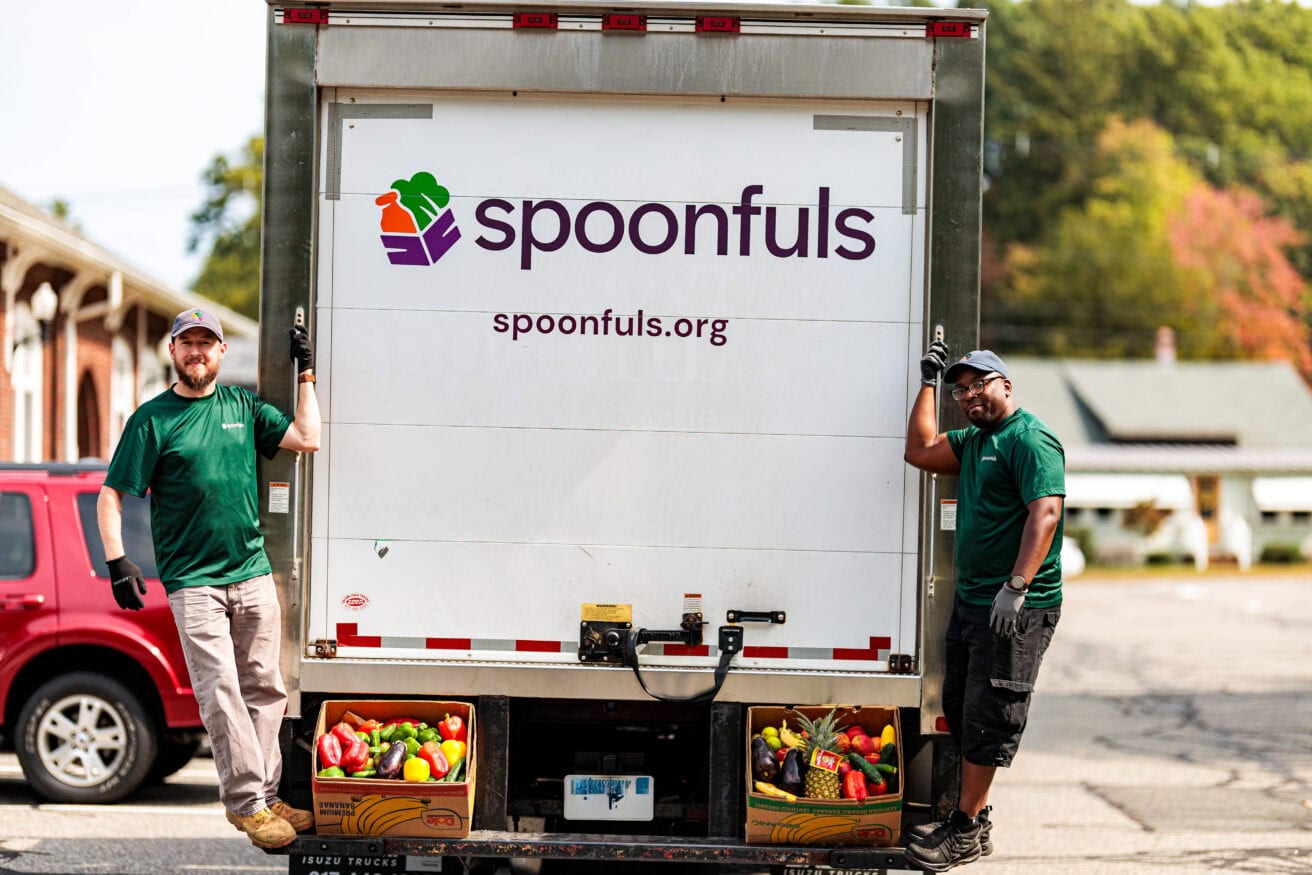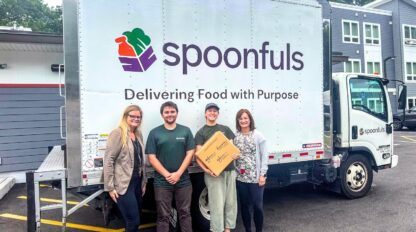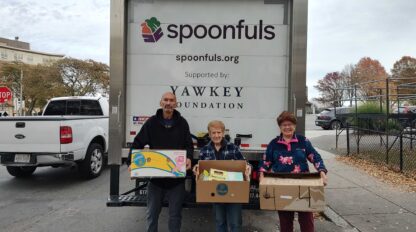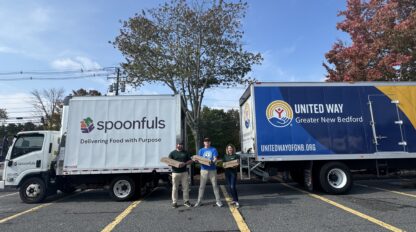Behind the scenes with Jon and Rich: How building strong relationships helps us recover more food

Here at Spoonfuls, we have always utilized professional staff to do the work of food recovery. It’s one way we create greater accountability on our team and consistency for the organizations (like local pantries and meal programs) that count on our deliveries. “It’s about so much more than picking things up and putting things down,” says Rich Bright, a Spoonfuls’ Food Recovery Coordinator from Springfield. “We’re getting the food from where it is to people that could use it, but making the most of what’s out there involves good communication and strong relationships with everyone we work with to get the job done.”
Rich and his coworker, fellow Springfield-based Food Recovery Coordinator, Jon Burdick, describe themselves as relationship-managers because relationship building is key to maximizing the amount of food our team is able to recover. They, alongside the rest of our Food Recovery Team, work hard to untap the potential for food recovery by understanding what retailers and brands in their region have available and what food programs could most use it. “It’s all about being useful,” adds Jon.
But it doesn’t stop there. Here’s an inside look at Rich and Jon’s top strategies for creating strong, productive relationships with the retailers and brands who donate the food we recover, leveraging one of our greatest food sourcing superpowers: partnership.
Be a storyteller.
When visiting retail partners, Jon and Rich tell them what Spoonfuls does, how we do it, why — plus, where they fit in. Says Jon, “Our store partners should understand why we’re on the lookout for a certain kind of product and where their donations go. We tell them why those donations matter and give examples of things we’ve seen and heard firsthand.” This creates greater awareness, builds credibility, and, ideally, leads to greater opportunities for food recovery. When a store manager knows they’re feeding a family rather than trashing good food, they’re more likely to keep donating (and donate even more).
Leave a business card.
Missed someone but need to talk? Jon and Rich leave their cards or even a handwritten note with a phone number. From their experience, the simple gesture makes it easy for retail partners to connect with them by ensuring they have the right contact information handy. It also demonstrates that they’re ready and willing for open communication. Never underestimate the importance of a physical reminder!
Have good dock etiquette.
Or, put another way, Jon and Rich try not to take up too much time or space. “We don’t just sit at a loading dock. We pick up the food set aside for us, and we go,” says Rich. “There are also times when we decide we don’t need the loading dock as much as the next driver…that we can instead bring donations on a u-boat down a ramp and load them into the truck that way. We tell the driver with a larger truck to go ahead. The next time our paths cross, that driver remembers us and usually returns the favor in some way,” says Rich. Being mindful of these situational codes of conduct creates rapport and sets a standard of mutual respect.
Stay curious.
Rich and Jon say they see opportunities for additional food recovery, including from some of our best retail and brand partners. “We have store partners that are donating lots of meat but little produce, or lots of produce but no dairy. What they’re doing already is great, but there’s always more that can be done,” says Jon. “Rather than point fingers like, ‘We see you’re not giving us that produce over there!’ we ask questions. ‘Did you know we could take that? There’s an organization on my route that could really use it!’” says Rich. Often, there’s no malintent, simply a lack of awareness. By creating learning opportunities, Jon and Rich help to ensure they’re recovering as much good food as possible. And speaking of…
Remember you’re a teacher.
When culling (sorting product for best-fit donations), there are occasional times where Jon and Rich recognize a need for improvement – a donation that doesn’t comport with Spoonfuls’ date label guidelines or one that has visibly spoiled. Here, too, say Rich and Jon, take the opportunity to educate. Remember, there are benefits for both sides in getting this right! More and better quality food donations mean lowered waste hauling expenses for the product that can’t be sold.
Pay attention to the small stuff.
A few overfull boxes. A too-tall stack. Most of the donation looks great except for… By not tackling small problems early and often, Jon and Rich know they can become bigger problems that are harder to address. Rich says, “If you don’t name the issue right away and come up with a plan to take care of it, chances are that when you do, you’ll hear things like, ‘But you never told me!’ and this impacts the trust you’ve worked to develop.”
And last but certainly not least…
Center the people who eat the food you deliver.
Keeping Spoonfuls’ end-recipients in mind motivates Jon and Rich to work hard to cultivate the strongest working relationships they can. “Those relationships benefit our neighbors,” says Jon. “So when it comes time to have a tough conversation, I remind myself why I’m having it. And when things are going great, I remind myself to share the successes with the retail/brand partners whose donations are making a difference.”
Across the state, Spoonfuls’ Food Recovery Team operates from a place of intention. “That’s relationship-management 101,” says Rich. “Be intentional – know what you’re doing and why you’re doing it.”
These practices – made possible by Spoonfuls’ full-time, professional food recovery staff, like Jon and Rich – are key to our food recovery operations. Thanks to the care our team puts into relationship building with food donors (and our community partners!), we recover enough food for people facing food insecurity each week to create 88,000 meals.


